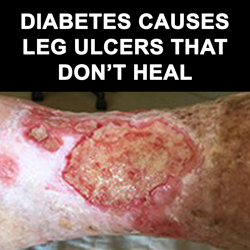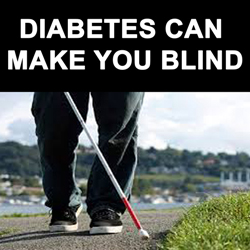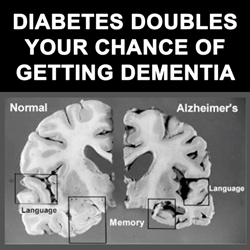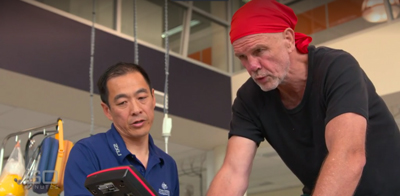Hello Daughterly Care Caregivers, and clients and families of our clients,
I want to share some important information with you that I wish I had known 10 years ago. I hope that it will help you and your family avoid doubling your chances of being diagnosed with dementia.
Decades of a sedentary lifestyle with little exercise, working long hours growing the Count business (www.count.com.au), followed by the Daughterly Care business, plus eating too many carbohydrates resulted in me being diagnosed with diabetes. This is despite the fact that I checked my blood sugar levels each time I checked my cholesterol and my sugars always came back “fine”.
…until I went to the Doctor recently to check out a recurring infection – and bingo! I was diagnosed with diabetes.
Of course, it felt like bingo…but in truth I had been building to diabetes for decades. In hindsight, there was nothing ‘sudden’ about my diagnosis at all. Once my blood sugar was “suddenly sky high”, my Doctor sent me to a Dietician. What this wonderful woman (the Dietician) explained to me, using language and pictures so that I could truly understand my situation – was life changing! We’ll get to that in a moment – because it’s worth you knowing, and it’s worth your children knowing.

Kate Lambert
CEO, Co-founder of Daughterly Care
And why do I care about diabetes now? Why should you care about avoiding or delaying getting type 2 diabetes?
A lot of Australians, like me, don’t care enough about preventing diabetes – as evident by the fact that it is an epidemic in Australia and in Western countries.
- “Australia has the second-highest rate of lower-limb amputations in the developed world – with the rate having risen by 30% over the past decade.” [Source 3]
- Dr Kean-Seng Lim says “The rising tsunami of diabetes in Sydney’s western suburbs will overwhelm hospitals within 15 years and specialist factories will need to be built to perform amputations”2
- “Five-year survival rates for those with diabetic foot problems are lower than for prostate, breats and colon cancer, yet the severity of the problem isn’t widely recognised [Source 3]”.
At end Source 3 = http://theconversation.com/explainer-how-diabetic-foot-disease-can-lead-to-amputations-and-even-death-66571
What?! Imagine that…we will have to build specialist amputation factories!
I knew Diabetes lead to amputations of limbs but still that was not enough to get me serious about preventing diabetes.
Seeing the leg ulcers that elderly people get from the damage done to their vascular system as a result of their diabetes to their feet and legs is horrifying ……but it still wasn’t enough to get me serious about diabetes.

Diabetes Facts2
- There are more than 4,400 amputations every year due to diabetes
- Each year there are 10,000 hospital admissions for diabetes-related foot ulcers
- Diabetic foot disease costs Australia around $875 million every single year.
- 85 percent of diabetes-related amputations are preventable.
When Daughterly Care’s Registered Nurse, Verlie, worked for St Vincent’s Community Health, she dressed lots and lots of leg ulcers and seeing the end result of diabetes and how much it decreased Elders’ quality of life made her highly motivated to get me on track.
Having Verlie, a Registered Nurse say to me one day:
“you are going to get diabetes! You are over-weight. You don’t exercise enough. You are a prime candidate. You are a TICKING TIME BOMB and people like you are costing our health system $7 billion a year and we can’t afford it. You make me angry because this is preventable! I am appointing myself as your Personal Care Manager. All you have to do is, what I say…eat less sugar, exercise more and lose weight! Don’t you care about yourself? What about your children?”
…even that concerned tirade was not enough to get me serious about preventing diabetes (though it should have been for my children).
Type 2 diabetes:
- can be delayed or prevented in 58 per cent of cases
- represents 85 per cent to 90 per cent of all diabetes cases
- usually develops in adults over the age of 45 years but is increasingly occurring in younger age groups2
Being diagnosed with type 2 diabetes and having my lovely Doctor read me the riot act wasn’t enough for me to get serious about reducing my blood sugar levels…
But what my Dietician explained to me was terrifying …and she turned my attitude around within 30 minutes!!!
My blood sugar levels tests had been low enough to ‘fly under the radar’ because my pancreas was heroically pumping out insulin. It was desperately trying to keep my blood sugar levels down and it was succeeding. Until it, just couldn’t keep up the pace and my blood sugar levels shot up. My Dietician drew me a picture of insulin and she drew a picture of a spikey hormone then explained that it bumps around your blood vessels causing damage to your vascular system and nerves.
This in turn increases blood clots which leads to an increase in heart attacks, an increase in strokes, also an increase in the damage of your vascular system. Especially in the smaller finer parts of body like in the feet (yes, diabetes causes infections not to heal, ulcers to form and limbs to be amputated), eyes (yes diabetes can cause blindness) and kidneys (yes, lots of insulin punches holes through your kidneys so that they end up not working).
And here’s what I didn’t know and I didn’t like hearing….“Causing damage to your brain”.
Did you know that type 2 diabetes is associated with an increased risk of Alzheimer’s Disease and Vascular Dementia, the second most common type of dementia. In fact, the Alzheimer’s Australia National CEO, Carol Bennett highlights the link stating “The risk of developing dementia in the general population is around 10%, for people with diabetes this risk significantly increases to around 20%.”
Oh no! My successful type A personality, my workaholic, busy-brain, lazy-body ways had DOUBLED my chances of getting dementia.
My body doesn’t matter to me, except as a vessel to get me through life. I have never been slim. But my brain…well, it matters a lot to me.
If someone had told me that my lifestyle choices were doubling my chances of getting dementia 10 years ago, I would of understood the damage I was doing to my brain. I would have gotten motivated and lost the 15kgs, I have now lost through:
✔ effective medication,
✔ eating more vegetables, less sugar and less carbohydrates; and
✔ moving more to burn sugar

I have reduced my blood sugar levels from 19 to 6. For the majority of healthy individuals, normal blood sugar levels are between 4.0 to 6.0 mmol/L (72 to 108 mg/dL) when fasting. Up to 7.8 mmol/L (140 mg/dL) 2 hours after eating.
By changing my diet, I have avoided having insulin injections. Although, I need to keep losing weight because then I might be able to reduce my need for 3 different diabetes medication!
I asked my Dietician… “But I had been getting my blood sugar levels tested and they were “fine”. Why the change, all of a sudden?” Here’s the second thing I didn’t know…
My Dietician said, “the Doctors are testing the wrong thing”. They shouldn’t just test the level of sugar in your blood – they should test the amount of insulin your body is pumping out to maintain your “ok” blood sugar levels. It was a Naturopath who suggested I get my insulin levels checked.
My torso fat was covering my insulin receptors
Health professionals talk about torso or stomach fat being extra bad for you. Here’s just one reason why. My Dietician drew a picture of insulin receptors on my organs and explained how they ‘feedback’ to the pancreas to produce the right amount of insulin. After all, given that insulin is spikey hormone and damaging to our blood vessels, we definitely don’t want too much of it bumping around our vascular system.
But my receptors were not ‘feeding back’ properly because they were covered in fat so my insulin levels were remaining high, even when they could have been lower.
Oh.
Okay.
Right.
Now I understood why Nurse Verlie and my Doctor had been on my back to lose weight for 15 years. I desperately needed to lose weight, in order to give those receptors a better chance of doing their job properly.
Okay, now I get it!
Here is what I want to share with you.
I can tell you from my experience, from what people have told me and from observing the work performance of people with un-controlled high sugar levels …high blood sugar levels make you “foggy in the brain”. It also makes you “not feel well”. People with diabetes often say “I just don’t feel well”…that’s your body screaming out – you are killing me with too much sugar! It’s harder to think clearly when your blood sugar levels are high. I recently invested 4 solid days researching how we can prevent Alzheimer’s and listened to numerous Doctors refer to “diabetes 3″ …”diabetes of the brain”.
A friend asked me recently, “I don’t know about you but I have to think really hard at work, do you?”
As soon as he said that, I knew he had the “foggy pre-diabetes brain”. His doctor kept testing his blood sugar levels and saying his results were “fine” or “ok” but his Doctor did not test his insulin levels.
Knowing what I know now, I made him get his insulin levels tested and guess what? He is pre-diabetic. He was pumping out insulin to keep his blood sugar levels low enough to be “ok”, damaging his vascular system. Now he is on medication to try and prevent him becoming diabetic.
Better still, he is in a position to make 2 informed choices:
1. dramatically reduce his sugar / carbohydrate intake (for him, like many Australian men the culprit is alcohol) and start exercising to burn sugar.
2. or choose to stay on the path to diabetes with all its co-morbidities such as an increased chance of a heart attack, stroke and double his chance of dementia – oh no!
Men, if you missed Peter FitzSimmons Sunday night on 60 minutes then it would be worth your while watching him online now.
Fitzy says men need to be spoken to more bluntly than women. He has lost 40kgs and says:
- manning up
- totally ceasing drinking alcohol
- reducing sugar intake; and
- exercising more worked for him.
Fitzy also warned that Dieticians are too wishy washy with their advice and need to tell it “as it is” …which is interesting because his comment happened to coincide with my decision to make my own “adverts” to cut through to people like me who are not getting the message early enough.
Our health system is not educating us EFFECTIVELY and EFFECTIVELY is the word.
They are telling us but we are not listening. We are not getting it. We are not doing what we know we need to do.
Where is the tax on sugar to pay for the $7 billion per annum health care costs (and you can double that cost if you take into account productivity losses)?
Where are the pictures and simple messages that cut through to us, in our busy world?
Here are some, we made taking a lead from the ‘smoking kills’ campaign.
Diabetes = leg ulcers that don’t heal
Diabetes = amputations
Diabetes = disability
Diabetes punches holes in your kidneys. You can’t live without kidneys.
Diabetes can make you blind.
Diabetes doubles your chances of getting dementia.




I have reduced my blood sugar levels through:
- healthier eating, yes much more vegetables, less sugar, less carbs (rice, pasta and potato);
- moving more, yes exercise! I prefer to call it ‘moving more’. I’m stronger in my body and sharper in my brain. I don’t exercise. I move more. I walk fast listening to my favourite songs. I ride a bike with friends and talk, and puff; and
- Every day I make lots of small healthier decisions.
As a result I’m stronger in my body and sharper in my brain. I understand why my staff offered to go walking with me – even on the weekend – bless them.
I understand why the Alzheimer’s Association says, “what’s good for your heart is good for your brain”.
And all around me, I see the people who were like me, uninformed, addicted to sugar highs, manic on sugar highs.
November 14 was World Diabetes Day…every day…every meal is diabetes day for me!
This year the focus for World Diabetes Day is to “test to prevent Type 2 diabetes”.
How about you get your blood sugar levels tested and talk to your Doctor about the merit of getting your insulin levels or insulin resistance tested, especially if you are overweight, carry torso fat or are over 45.
Now here is some factual information about diabetes from Charmayne, one of the lovely Daughterly Care Registered Nurses.

Diabetes mellitus is a chronic disease in which there are high levels of glucose in the blood. In type 1 diabetes the body does not make insulin and in type 2 diabetes there is insulin deficiency or resistance. When the body does not have enough insulin or cannot use insulin to turn glucose into energy the result is hyperglycemia. If untreated high blood glucose can lead to complications with kidney, eye and nerve damage and heart disease such as angina, heart attacks, strokes and circulation problems resulting in foot ulcers or infections.
In Australia over 1.2 million people are known to have diabetes. Eighty five percent have type 2 diabetes. It is estimated a further 500,000 people have type 2 and remain undiagnosed. Type 2 diabetes can occur at any age but is more common in older people. Of the 1.2 million over 700,000 are aged 60 years or older.
Type 2 diabetes is associated with an increased risk of Alzheimer’s Disease and vascular dementia.
Alzheimer’s Australia National CEO Carol Bennett highlights the link stating “The risk of developing dementia in the general population is around 10%, for people with diabetes this risk significantly increases to around 20%.”
What causes the association between diabetes and dementia risk is not clearly understood. Diabetes does not necessarily cause dementia and most people with dementia don’t have diabetes. More research is needed to prove that effectively managing diabetes can reduce the risk of dementia however it seems likely that managing blood glucose levels will reduce the risk of the health problems outlined above including dementia.
To reduce your risk of type 2 diabetes – test to prevent. Check blood sugar and insulin levels regularly, maintain a healthy body weight, increase physical activity and eat a diet high in fruits, vegetables, whole grains, beans, nuts and seeds.
It is recognised that lifestyle factors remain unproven as a means of preventing dementia however, physically active people have a lower incidence and evidence continues to accumulate in support of modifying lifestyle and activity levels. High levels of social, mental and physical activity are associated with a decreased risk of dementia.
Type 2 diabetes can be prevented and / or delayed. ****The risk of developing type 2 diabetes can be reduced by up to 58% when you maintain a healthy weight, are physically active and follow a healthy eating plan.***
The key is prevention and early detection – test to prevent.
References
https://www.fightdementia.org.au/media-releases/diabetes-can-double-dementia-risk
https://www.alz.org/national/documents/latino_brochure_diabetes.pdf
https://www.diabetesaustralia.com.au/
Prevention of Dementia, Daniel Press, MD and Michael Alexander, MD, Up to Date, October 2016
https://www.uptodate.com/contents/prevention-of-dementia?source=see_link§ionName=LIFESTYLE%20AND%20ACTIVITY&anchor=H10#H10
Risk factors for cognitive decline and dementia, Eric B Larson, MD, Up to Date, October 2016
https://www.uptodate.com/contents/risk-factors-for-cognitive-decline-and-dementia?source=see_link§ionName=LIFESTYLE%20AND%20ACTIVITY&anchor=H14#H14



Thanks for the share, missed Peters story on 60 mins, and do enjoy his books.
He looks great and is inspiring.!
Need to get my insulin checked!!!
Thank you for such an informative blog .You have just inspired me to take a much more concerted effort with my diet and exercise .
I love that article and I love the fact that Daughterly Care is so committed to its employees to get really life enhancing information about daily lifestyle .You say it as it is and ease the absorption of the information by owning your experience with what you are sharing .
Truly Amazing! Thanks so much for taking the time to share what you now know. I’ll be sure to share it too. And, good for you Kate, good on you!
The info on diabetes is fantastic and if only more people did pay attention to their health and realise their health is in their own hands. I was a medical secretary in my younger years and it opened my eyes to a healthy lifestyle all through life was just so important. Good on you Kate for sharing with us and making an effort – you are a fantastic role model!!
Wow that was definitely an eye opening read to me .I will be taking my sugar intake a lot more serious now and ask my dr to do an insulin test on me too.
That is really valuable information, thank you. Working with people with dementia as we do should be enough insentive to take more responsibility for our health and wellbeing.
There is a great documentary about the perils of sugar especially white sugar which is also very informative.
Dear Kate, I just read your very interesting advise and information and understand all of what you have written as I was very overweight and found an eating program that worked for me and reduced my intake of sugar which really did work, however now I have put the weight back on twice and lost it twice, due to high levels of stress in my life, so my point is that its all well and good to talk about reducing sugars in our diet, it is hard for some people to understand what sugars and carbohydrates really are and what types are foods are higher than others, I have research this and found it really simple however complex as some people don’t this carbohydrates are bad for them and don’t truly understand how much sugar is in carbohydrates and what is a good food source in carbohydrates to eat, I am saying this because when you say cut our sugars, the craving you have for sugar and the body’s and the minds ability to act as a fighter in regards to the craving is very real and unless you quieten down these craving it will be almost impossible to stay on a healthy low sugar eating program and to do this I had to increase my protein level at each meal so I would get the cravings. I so want to form a group of like minded people who I could support and who would help me also as I would get great joy out of helping others to educate and show them what I have achieved and learned and that’s why I also feel passionately about losing weight through good eating programs that suit the individual person as some don’t always work for some people, and my aim would be to help others to reduce weight and have a clear mind, thank you regards Kelly
Thank you for the wonderful realities in print of how we need to be living our lives to keep living in a healthy body. I will be sending this article to all my family and friends. No matter how we hear it, each new way captures someone’s ear and may save someone’s life. I will be getting my insulin checked asap!
Well done Kate for making your health a top priority.
Thank you for all the information .My Mum had diabetes and in the end had to have a couple of toes amputated. I need to pay attention.
Thank you Kate for sharing this information. I have forwarded it onto my daughter who also lives a sedentary life and is over weight. I worry about her as I have told her that she has an increased risk of stroke and heart failure due to her weight . I knew about diabetes,but not about dementia… So thank you…
Veronica
Well girls life is full of suprises but the suprises as we get as we get older aren’t the ones we necessarily want to know about or face up to. I had some news about eye health last week, so you’ve encouraged me to go and have my sugar checked. Well its just a case of relaxing and getting on with it. Thankyou for spreading the word ladies you could save many lives. Louise.
Thank you Kate, it is very important and totally informative, thank you for all the information you share with us, my husband has type 2 diabetes for number of years, we always misunderstood and ignore some important symptoms, the trigger of diabetes and how to prevent it, it is of great benefit to us to here your side of the story, thank you.
Kate You are truly an inspiration. That information was wonderful and you are very strong to turn your life around it isn’t easy. My mother passed away last March from a foot ulcer that wouldn’t heal. The nerve pain was so bad she asked to go to Hospital to commence the Syringe Driver. Although her Diabetes had been controlled for many years the damage had already been done. Everyone should get checked regularly. Thank you
Thank you for sharing your story and for this informative article, much appreciation to you!
Thank you Kate for taking the time to share this with us – it has spurred me on to ask my doctor to check my insulin levels if he hasn’t been doing that, as I could be a candidate for this as well! I have joined a seniors Gym and now cant wait to get back to it.
Congratulations on turning your health around Kate and inspiring others to do the same.